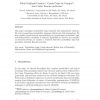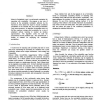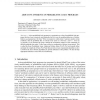151
click to vote
AAAI
2011
14 years 2 months ago
2011
Plan recognition is a form of abductive reasoning that involves inferring plans that best explain sets of observed actions. Most existing approaches to plan recognition and other ...
152
click to vote
CORR
2011
Springer
14 years 5 months ago
2011
Springer
The probability theory is a well-studied branch of mathematics, in order to carry out formal reasoning about probability. Thus, it is important to have a logic, both for computati...
115
click to vote
APIN
1998
15 years 1 months ago
1998
Incidence calculus is a probabilistic logic in which incidences, standing for the situations in which formulae may be true, are assigned to some formulae, and probabilities are as...
114
click to vote
JAL
2008
15 years 2 months ago
2008
This paper develops connections between objective Bayesian epistemology--which holds that the strengths of an agent's beliefs should be representable by probabilities, should...
124
click to vote
IJAR
2008
15 years 2 months ago
2008
This paper investigates probabilistic logics endowed with independence relations. We review propositional probabilistic languages without and with independence. We then consider g...
93
Voted
IJCAI
1989
15 years 3 months ago
1989
Nilsson's Probabilistic Logic is a set theoretic mechanism for reasoning with uncertainty. We propose a new way of looking at the probability constraints enforced by the fram...
133
click to vote
AAAI
2008
15 years 4 months ago
2008
Probabilistic logic programming is a powerful technique to represent and reason with imprecise probabilistic knowledge. A probabilistic logic program (PLP) is a knowledge base whi...
131
click to vote
ICLP
2010
Springer
15 years 6 months ago
2010
Springer
ABSTRACT. Action-probabilistic logic programs (ap-programs) are a class of probabilistic logic programs that have been extensively used during the last few years for modeling behav...
126
click to vote
ECAI
1998
Springer
15 years 6 months ago
1998
Springer
We present probabilistic logic programming under inheritance with overriding. This approach is based on new notions of entailment for reasoning with conditional constraints, which...
132
click to vote
ISIPTA
2005
IEEE
15 years 7 months ago
2005
IEEE
This article presents a probabilistic logic whose sentences can be interpreted as asserting the acceptability of gambles described in terms of an underlying logic. This probabilis...



